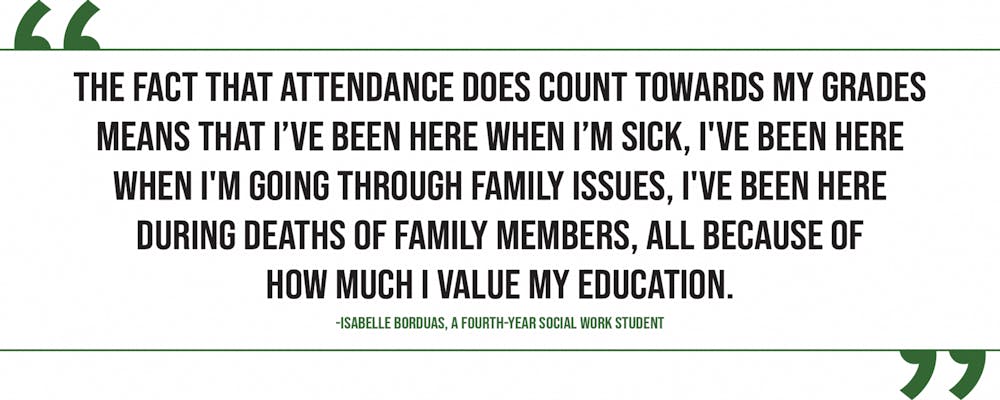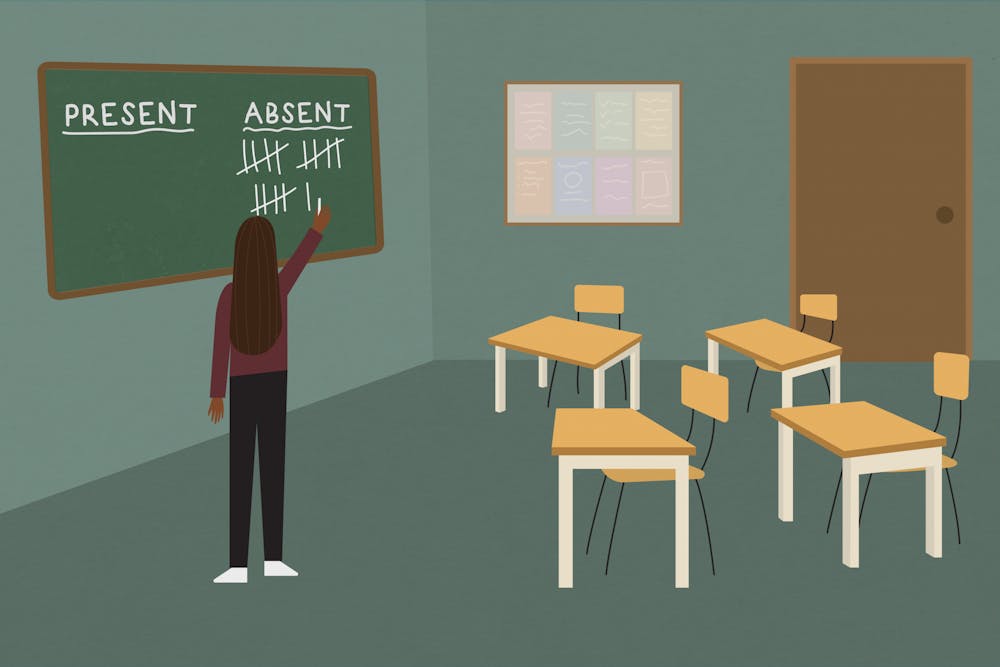Over the course of a college career, students may encounter obstacles that get in the way of going to class, and, whether it’s a full-time job, mental health struggles or a legitimate sickness, students’ grades should not be penalized every time a doctor’s note cannot be provided.
USC's standard policy for unexcused absences is the 5% rule, which gives professors the option to penalize a student's grade only after they miss 5% of class time without an excuse, which amounts to less than three class periods over a full semester. This means that, without a documented excuse for their absences, a student’s academic performance can suffer despite strong performance in the class.
It is entirely up to the professors to enforce this rule, however. While some professors are lenient about their attendance policy, others choose to enforce the university's policy. Mark Samudre, an assistant professor in the College of Education, and Kurt Hoberg, an English instructor, both take attendance in their classes but said they are willing to make arrangements with students who communicate with them ahead of time.
"In the end, I let every unexcused absence only reflect a one-point deduction on the grade," Samudre said. "I don't penalize it heavily, and that as I've seen has encouraged students to just be really honest with me in terms of the nature of their absence."
According to an article by Small Business CEO, attendance policies are put into place to encourage students to participate in class and set them up for future academic success. While it is important to attend class, it doesn’t seem beneficial for students who regularly receive high marks to have their grades dropped just for being absent.
“The fact that attendance does count towards my grades means that I’ve been here when I’m sick, I've been here when I'm going through family issues, I've been here during deaths of family members, all because of how much I value my education,” Isabelle Borduas, a fourth-year social work student, said.

Some professors may require a doctor’s note as an excuse, but going to the doctor’s office just for a cold can mean spending a lot of time and money. Sometimes, those visits only result in a doctor recommending a trip to the pharmacy for over-the-counter medicine.
Samudre said that he would rather not have his students push themselves to attend class if they're not feeling well, especially because they risk spreading their symptoms to classmates. As long as students honestly explain their situation, Samudre said, they are not penalized.
Even for those who arrive on time every day, personal stress and exhaustion can prevent students from absorbing new information in class.
“I think missing three classes is a bit too little," Guillermo Ramis, a second-year education student, said. "I think I would change (the attendance policy) to five (unexcused absences), because sometimes students — they need mental breaks.”
According to a 2020 CourseKey article, over 75% of students feel inclined to skip class due to mental health reasons such as depression, anxiety and stress.
Universities should also consider issues that do not involve health and sickness as excuses for absences as well. Borduas believes that excuses are also valid for other unexpected disruptions like transportation troubles.
Sarai Deese, a second-year psychology and public health student, says there should be ways for all students to meet the course criteria regardless of how many classes they’ve missed in a semester.
While mandatory attendance could also be a measure to prevent students from developing a habit of skipping class, it is really up to each student to decide if they want to attend class or not. College students are adults and, therefore, should be responsible for catching up with their professors as they see fit.
However, consistent attendance is crucial for learning the material, according to Hoberg. Therefore, it would be beneficial for USC to offer more virtual classes so that students can better manage their academic and outside lives. By reducing the time it takes to drive or walk to campus, students can focus more of their attention on doing homework and studying.
During the spring 2023 semester, USC currently offers 959 online courses. However, many of these are major-specific, meaning online or hybrid sections of a class may not be open to all students.
Further, online classes would likely appeal to commuter students and students with disabilities, especially, and additional modalities could relieve the stress that an in-person attendance requirement can put on a grade. This option would also allow for more flexibility in a student's schedule and have an effect on transportation concerns, such as traffic and on-campus parking.
Instead of punishing students for missing class, professors should reward students who show up to class regularly by administering extra credit questions on specific in-person days or adding points to a test or quiz. Motivation plays a role in attendance, and this may encourage students show up for the right reasons. In general, attendance policies should help the student's grades, not harm them.

